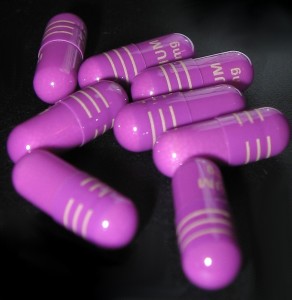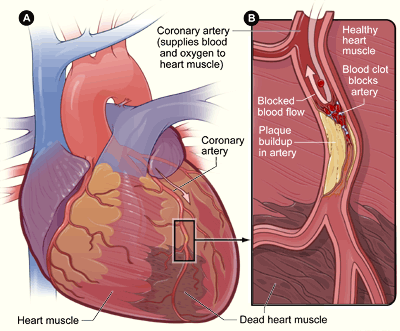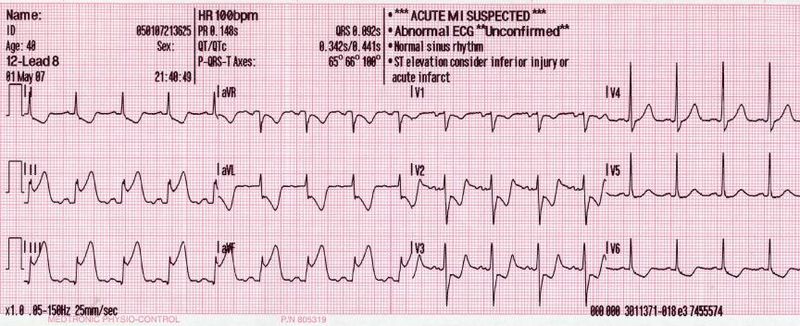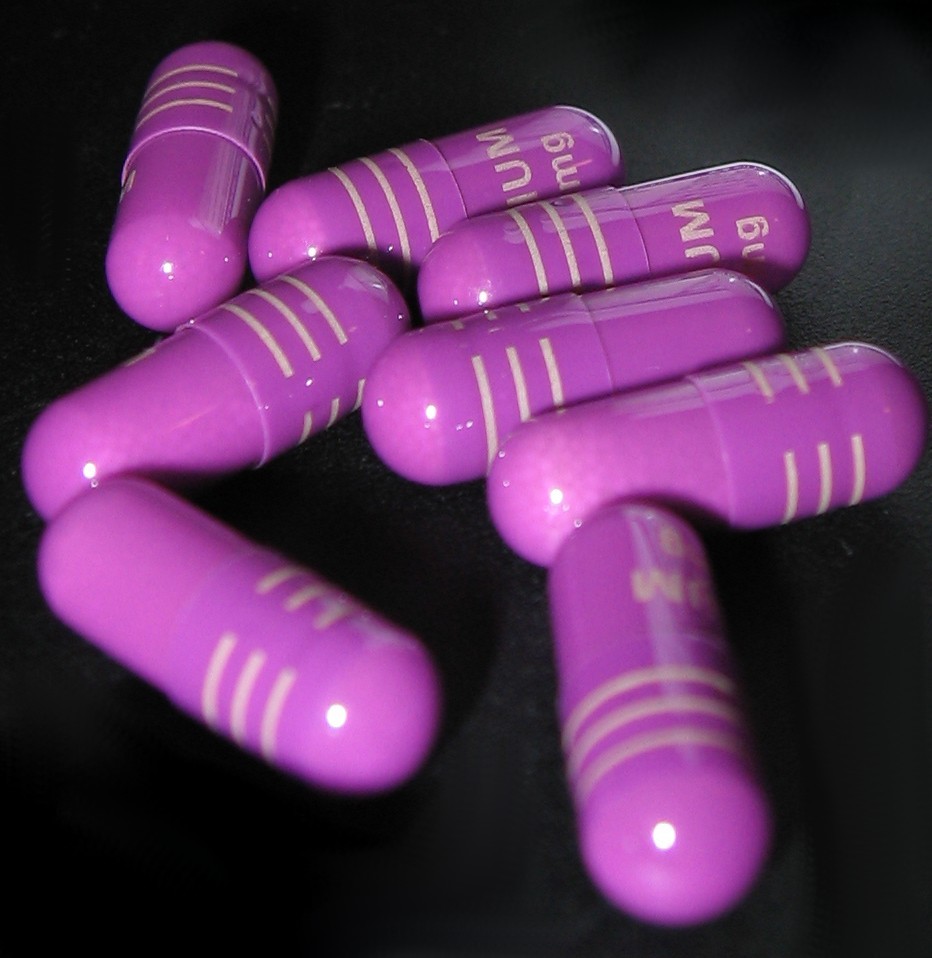
Nexium
There has been concern for several years about commonly prescribed antacid drugs called proton pump inhibitors (PPIs) and the heart. PPIs are used to treat gastroesophageal reflux disease (GERD), peptic ulcer disease, and other acid-related diseases. Common drugs in the PPI class are omeprazole (Prilosec), esomeprazole (Nexium), pantoprazole (Protonix), lansoprazole (Prevacid), and dexlansoprazole (Dexilant), among others.
Specifically, there is a potential interaction between certain PPIs and clopidogrel (Plavix), where the net result is that the effectiveness of clopidogrel may be lowered by coadministration with PPIs. Clopidogrel is an antiplatelet drug that is often given to patients who receive cardiac stents, and it happens to be metabolized to its active form by the same liver enzyme that metabolizes most PPIs. The drugs compete for the enzyme, and this can lower the effect of clopidogrel. Theoretically, this can lead to adverse cardiac outcomes in patients with stents. This in vitro effect was not found clinically meaningful in a recent randomized controlled trial (Bhatt DL, et al.), however the PPI-Plavix interaction is still a controversial topic and further details are beyond the scope of this article.

I bring up the PPI/clopidogrel issue because it becomes important in understanding a new study by Shah et al. published this month in the journal PLoS ONE. This study used a technique called “data-mining” to extract information from years of electronic medical records (EMRs) and included about 70 thousand patients in their primary analysis. They describe the data-mining technique in the article (linked below), which seems to boil down to assigning a mathematical function to certain defined variables (patients taking PPIs) and an outcome (heart attack) to see if the two events are associated.
The authors conclude that PPI use is associated with heart attack, with an odds ratio of 1.16 (not a very strong effect, approximately 4000 patients would have to take PPIs for one heart attack to occur). This effect is independent of clopidogrel use, and is not seen with weaker antacid use (histamine-2 receptor blockers, e.g., zantac, pepcid). If true, this suggests that PPIs may have an independent causative mechanism for inducing cardiac disease, and the authors cite inhibition of endothelial nitric oxide synthase (eNOS) as the most plausible mechanism. eNOS is the enzyme that produces nitric oxide, which is a vasodilator substance that is made and acts locally to increase blood flow to tissues. If PPIs decrease eNOS function, blood flow may decrease to the muscle cells in the heart, and a heart attack may result.

These conclusions, taken at face value, are concerning. However, a good little scientist reads a study then tries to tear it apart and see if it stands up to scrutiny. In my opinion, this study does not make the cut. The entire premise of the study is based on data extracted from EMRs based on user input into the patient charts. Anyone that has worked with an EMR knows that much of the information that is carried forward by the system is inaccurate, untrue, or outdated. Sometimes, less-than-optimal patient notes are written into the system to save time, or because rounds were starting and the intern writing the note was afraid of being late, or because the patient is being discharged and their ride is here waiting for the “paperwork” to be completed, or for many other reasons. Sometimes the information written in the patient chart was thought to be true one day, only to be disproven the next day when further tests are done. So retrospective review of the charts are always limited by what actually makes it into the chart at the time. Most good retrospective studies have actual humans (usually students of some kind) manually extract the data from the chart to separate the signal from the noise.
In this study, they used this computerized data extraction method to analyze about one trillion pieces of data from 1.8 million patient encounters. The authors state that if the patient was started on a PPI, and if then the term myocardial infarction (MI, another term for heart attack) occurred in the chart after the prescription for PPIs was given, that this sequence of events counts as a PPI-related MI. How can we draw meaningful conclusions from computer-generated associations of terms that are put into the medical record that may or may not be accurate? The phrase “garbage in, garbage out” comes to mind…
How can we draw meaningful conclusions from computer-generated associations of terms that are put into the medical record that may or may not be accurate? The phrase “garbage in, garbage out” comes to mind…
The authors state they controlled for “age, gender, race, length of observation, and…the number of unique drug and disease concepts mentioned” as a surrogate for patient complexity. More important however, is what they did not control for: How about obesity, diet, smoking status, history of myocardial infarction, use of aspirin or NSAIDS, cholesterol levels, inflammatory markers, blood pressure…the list can go on and on. Obesity, poor diet, and smoking all increase acid reflux and are reasons why a particular patient may have been given a PPI. These same factors are also independent risks for cardiovascular disease. NSAIDs are causative agents for ulcers, which are then treated with PPI drugs. NSAID use also increases the risk of heart attack. Patients at high risk of coronary artery disease are often given aspirin as a preventive measure. Many of these same patients are often given PPIs to reduce the GI bleeding risk of aspirin and other blood thinners. When the methods of a study are so fundamentally flawed, everything that follows is built on false premises and therefore logical conclusions cannot be made from the results. In the interest of time, the educated reader typically stops reading any further at that point.
Furthermore, the conclusions drawn from a retrospective data-analysis type of study can never show causation. The best we can hope for is to show an association between two things. Prospective controlled trials are needed to show causation. So the authors conclusions are (at best) that patients who use PPI drugs are often also the same patients that have heart attacks. Since we are dealing only with associations, the converse would then also be true: patients that have heart attacks are statistically more likely to have taken PPI drugs. Only the statistics in question are very faulty in this study.
What is the bottom line? As usual, one should only take the smallest effective dose of any drug, to treat a real disease, for the shortest period of time necessary, after exhausting other reasonable treatment options. Medication should not be an alternative to diet or lifestyle changes. GERD or peptic ulcer disease, left untreated, can have many serious consequences such as esophageal cancer, gastric cancer, bleeding, and perforation of vital organs, not to mention that untreated symptoms of reflux and pain will cause loss of quality of life. One poorly-executed study does not change these facts. Does the possible link between PPIs and MI deserve further study? Yes. However, at this time there is no reason to change the current practices of prescribing PPIs.
If you enjoyed this article, sign up for our free newsletter and never miss a post!
References:
Bhatt DL, Cryer BL, Contant CF, Cohen M, et al. Clopidogrel with or without omeprazole in coronary artery disease. N Engl J Med 2010;363:1909-17.
Images via Wikimedia Commons authors “Myself” and “Heart Attack Grill“

